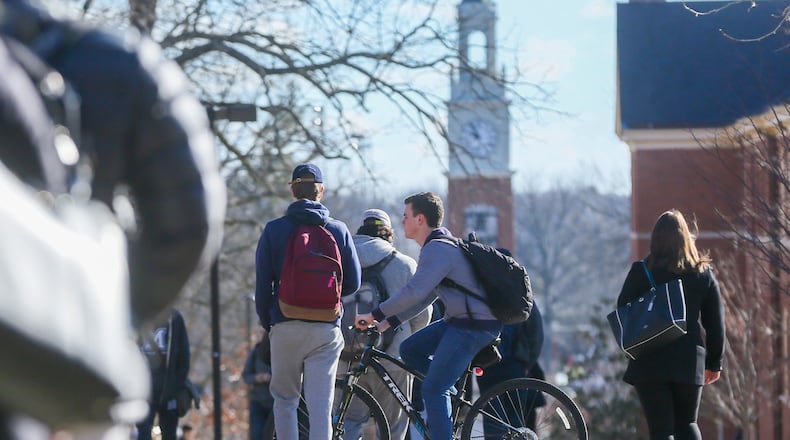“We have been dedicated this to for a long time,” Herron told the Journal-News.
In a climate resilience assessment completed in August, officials said there was a university fund with nearly $40,000 available for student-led projects focused on energy. The fund has not been used for at least 10 years, according to the assessment.
In 2019, hundreds of people lined up in front of President Greg Crawford’s home in Oxford as part of a nationwide protest about climate change inaction. The protesters covered an entire block.
Earlier this month, Crawford announced the university’s pledge to go carbon neutral by 2040. He did so in his state of the university speech. This doesn’t mean Miami will have zero greenhouse gas emissions. It means those emissions will be reduced and balanced out by things such as trees or solar panels or electric vehicles.
Officials say most of Miami’s carbon emissions come from energy used for heating and cooling buildings.
This summer, officials began removing hot water boilers from each residence hall that still had them. With steam systems, Herron said, there are 14 miles of piping under the campus which lose heat and require more energy and emissions. Officials say more than half of Mami’s buildings have been converted away from steam-based heating.
“We’ve reduced our energy-based emissions over 50% since 2012,” Herron said. “That is far surpassing any other public institution in Ohio.”
But reducing carbon emissions and slowing climate change is about more than just buildings. In the recent climate assessment, officials said drug and alcohol abuse was an exacerbating factor in climate change on campus. Other aggravating factors the assessment noted are:
- Structural racism
- Food insecurity
- Lack of affordable housing
- Undiversified economy
- Unemployment
Last fall, officials began charging a new student mental health fee of $50 per semester, according to the assessment. Officials said this fee helped fund additional counselor and staff positions at Miami’s Student Counseling Service. The assessment said availability of healthcare and mental health services in Oxford has improved, but more will need to be done.
“We expect increased future need of counseling services,” the assessment says.
Miami officials are currently reviewing a climate action plan, which is expected to be approved by trustees next year. Priorities of the plan are:
- Decarbonizing Miami’s campus through energy-based emissions
- Emissions from commuting and university-financed air travel
- Offsetting Miami’s carbon emissions
- Education and research
- Student engagement and outreach
- Resilience monitoring
About the Author

